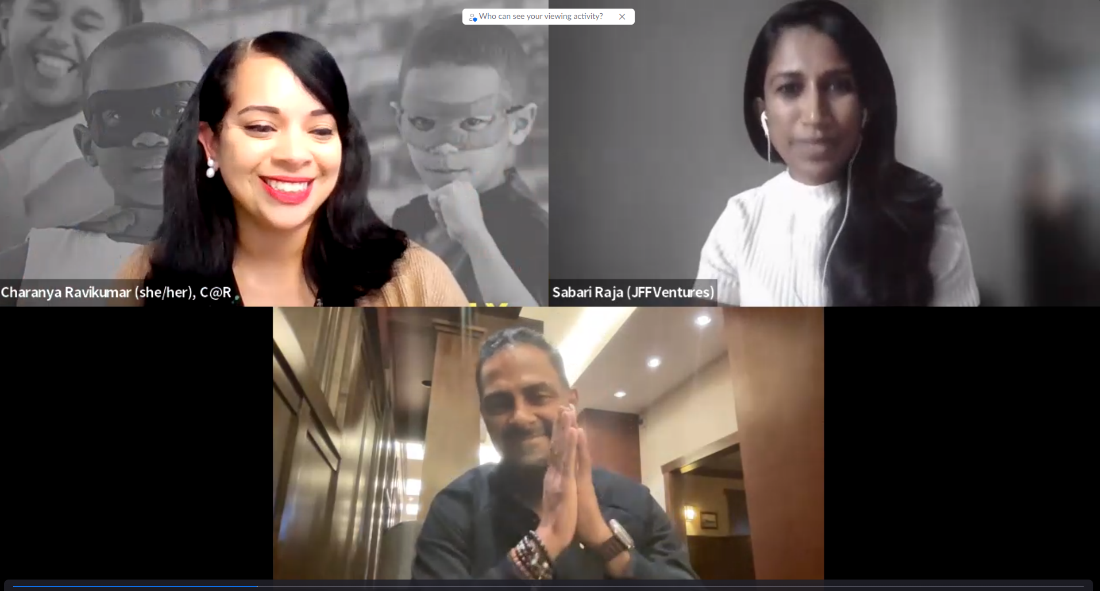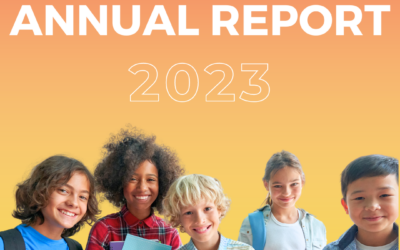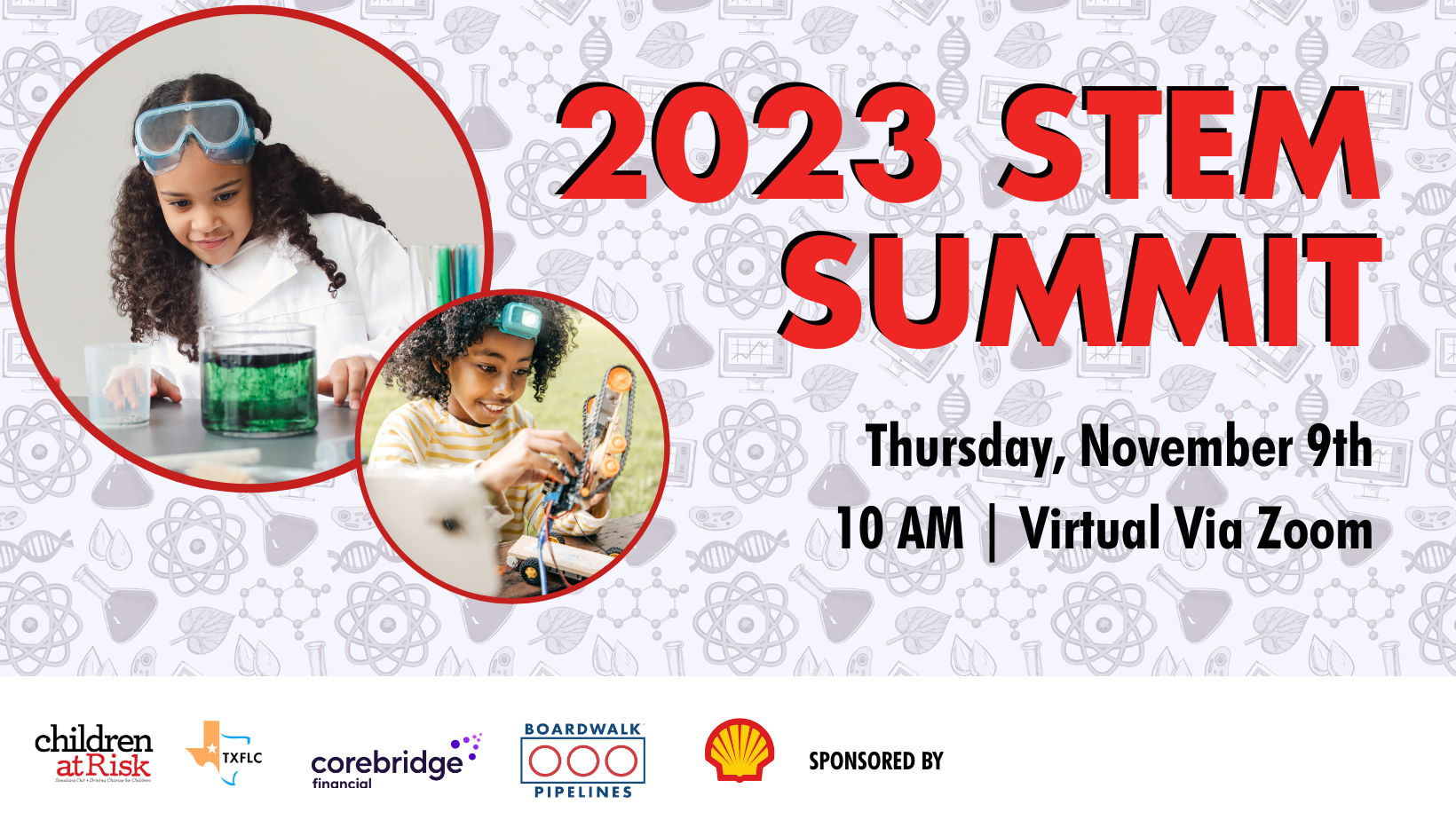
The 2023 STEM Summit was hosted on November 9th, 2023. Welcome remarks were provided by the emcee of the event, Claire Dutreix, Sr. Associate Director K-12 Education, CHILDREN AT RISK. The event began with a data overview, followed by 5 sessions made up of panels and a keynote speaker.
“Being very comfortable failure and in this culture we feel like you know we reward the successes extensively and discard the failures and we have to sort of change that mindset a bit.”- Sabari Raja, Managing Partner, JFF Ventures
Session 1 of the STEM Summit, titled “Tech Innovation and the Future Workforce Landscape,” featured Charanya Ravikumar, Chief Strategy Officer at CHILDREN AT RISK, moderating a discussion with Ganesh Padmanabhan, CEO, Autonomize AI, and Sabari Raja, Managing Partner, JFF Ventures. The session focused on the evolving landscape of technology and its impact on the future workforce. Panelists discussed emerging technologies, skills in high demand, and the changing nature of job roles. Participants explored how schools can adapt curriculum to align with industry needs, ensuring that students are equipped with relevant skills for the ever-evolving STEM job market.
Ganesh emphasized that exponential technologies like AI, blockchain, and virtual reality are transforming industries and increasing the need for specific skills. He highlighted the importance of problem-solving, empathy, multi-modal creativity, intuition, and the ability to continuously learn as critical skills for the future workforce. He also stressed the importance of focusing on what is uniquely human in an era of automation and intelligence.
The discussion also delved into the collaboration between academia and industry. Sabari highlighted the need for early exposure to real-world relevance, advocating for integrating industry connections into the curriculum from elementary school. She emphasized the importance of educators and teachers gaining industry work experience and the significance of involving teachers in the design of curriculum with industry input.
Data privacy and cybersecurity were addressed as significant issues in the digital world. Ganesh stressed the need to educate students about the ethical use of data and AI, emphasizing understanding, governance, and engagement. He urged educators to participate in shaping ethical guidelines for AI and technology.
The session also explored the gig economy and the need for entrepreneurial skills. Sabari and Ganesh discussed the importance of time management, project management, communication, and networking skills. They emphasized that project-based learning and experiential opportunities can help students develop these entrepreneurial skills.
In summary, the session highlighted the importance of preparing students for the future workforce by focusing on both technical and soft skills, promoting early exposure to industry, and addressing ethical considerations in emerging technologies. It emphasized the need for continuous learning and adaptability to thrive in the ever-changing landscape of technology and innovation.
Tech Innovation and the Future Workforce Landscape Participants
“When I work with companies or look at companies… the first thing I’m going to ask is let me see your board… and that tell me everything I need if that group is not reflective of the community in which [it] operates in.” H.Puentes,Co-Founder, President and CEO, San Diego Squared (SD2).
In session 2 titled, “Empowering All Voices: Inclusivity in STEM Education and Employment,” the panelists discussed the importance of inclusivity and diversity in STEM fields. The panel was Moderated by Cathy Chen-Arriaga, Executive Director, Fab Lab El Paso. Panelists included Sherrika Sanders, PhD, Sr Technical Engineer at Manner Polymers; Liliana González, Manager, Research & Impact at Society of Hispanic Professional Engineers (SHPE) ; and H. Puentes, Co-Founder, President and CEO of San Diego Squared (SD2). They shared their experiences and insights on how to promote inclusivity and diversity in STEM education and employment.
Dr. Sherrika Sanders emphasized the need for more diversity in the chemical industry and highlighted how inclusivity can lead to innovation in various areas, such as consumer goods. She also discussed the importance of mentorship and sponsorship in helping individuals from marginalized communities succeed in STEM.
Liliana discussed initiatives by the Society of Hispanic Professional Engineers (SHPE) to encourage underrepresented young people to pursue STEM fields. She emphasized the importance of representation, evidence-based programming, and leveraging federal programs to support diversity in STEM.
Puentes emphasized the significance of compensation and power dynamics in creating an inclusive environment in companies. He stressed the need for companies to focus on diversity at the highest levels, including boards and executive teams. He also highlighted the importance of reporting evidence-based programming and connecting with federal programs to support diversity in STEM.
Overall, the panelists underscored the importance of taking concrete actions to promote inclusivity, diversity, and representation in STEM education and employment, emphasizing mentorship, sponsorship, and policy advocacy as key strategies.
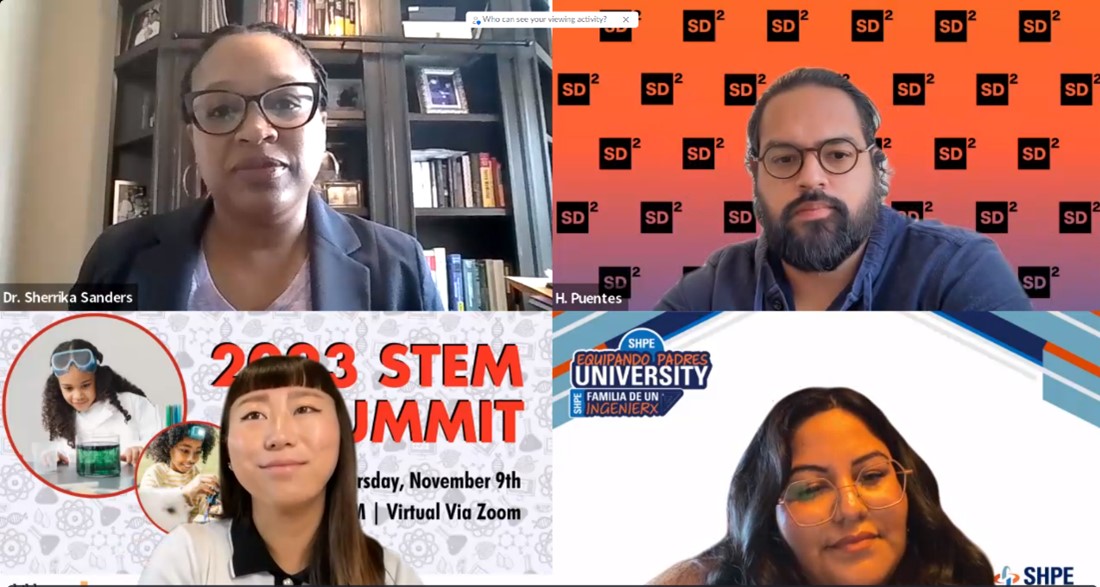
Empowering All Voices: Inclusivity in STEM Education and Employment Panelists
“Networking and mentorship honestly was something that has brought me really far in my career and that has also truly, truly allowed me to grow not only as a person but as somebody in my career as well.”- Marisa Plescia, Senior Chemist, Bell International Laboratories
In Session 3 of the STEM summit titled “Demystifying STEM Careers: Showcasing Hidden Opportunities,” the panelists discussed various aspects of STEM careers and shared valuable insights. The session was moderated by Dahlia Chaudhury, Project Coordinator at CHILDREN AT RISK. Panelists included Oluwadamilola (Dami) Fasina, Graduate Student Researcher, Applied Mathematics at Yale University; Marisa Plescia, Senior Chemist at Bell International Laboratories, Brian Mandell Ph.D., Division Director of Curriculum, Digital Media and Communications at Smithsonian Science Education Center.
Dr. Brian Mandel highlighted the importance of interdisciplinary skills in unconventional STEM careers, emphasizing research, interpersonal skills, and practical skills like project management. He advised early career professionals to consider taking business or project management courses.
Dami discussed the significance of artificial intelligence and machine learning in the evolving STEM field. He suggested that individuals interested in STEM should explore free online coding tutorials and YouTube videos to develop these skills, emphasizing the need for continuous learning and adaptation in the fast-moving technology landscape.
Marissa emphasized the role of networking and mentorship in career growth. She recommended joining professional organizations like the Society of Cosmetic Chemists and American Chemical Society, which not only offer networking opportunities but also provide platforms for continuing education and staying updated on industry trends.
The panelists also shared personal experiences that highlighted the rewards and challenges in their respective STEM careers. Dr. Brian Mandel spoke about the importance of making STEM education relevant and relatable to students by connecting it to real-world issues and stories. Dami highlighted the creative and rewarding aspects of a PhD in applied math, as well as the challenges of balancing academia and industry expectations. Marissa discussed the immediate gratification of working as a cosmetic chemist, seeing her formulations on store shelves, and the challenge of communicating scientific information effectively to consumers.
Finally, Dr. Brian Mandel discussed the integration of lesser-known STEM careers into educational curricula. He emphasized the importance of embedding stories of scientists into educational resources and making them relatable to students. He also stressed the need to capture stories from diverse perspectives and backgrounds.
In summary, the panelists underscored the importance of interdisciplinary skills, continuous learning, networking, and mentorship in STEM careers. They shared personal experiences that highlighted the unique aspects of their fields and provided insights into how educators can make STEM education more engaging and inclusive.
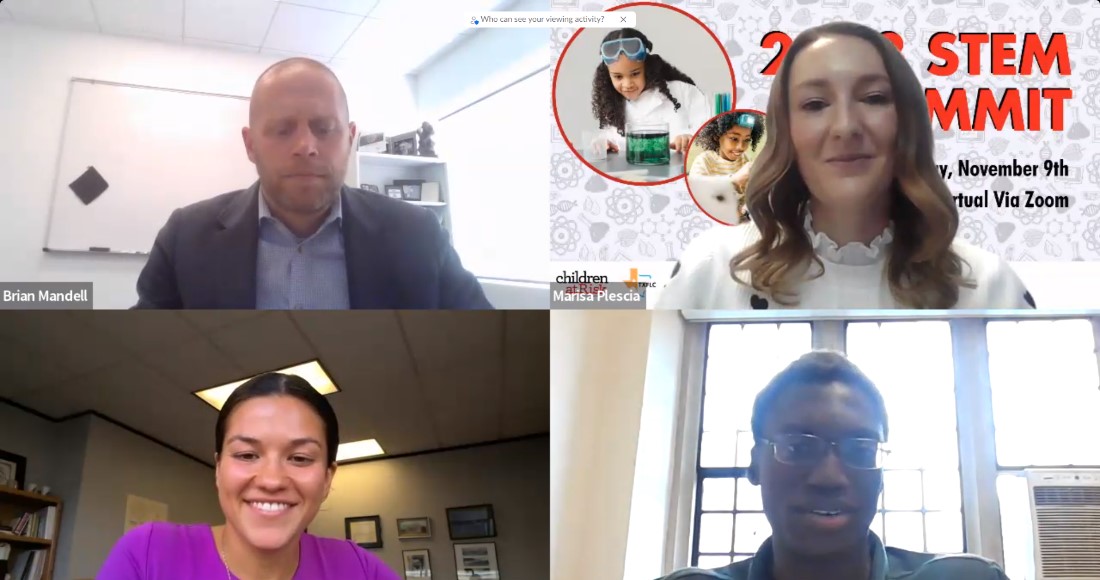
“Industry sponsors in the past as well as TEA and others support the development and recruit students into Stem programming areas as far as high school especially high school teachers and the main point of that partnerships was to get universities to understand that they are essential in creating teachers. “- Michael Odell, Ph.D. Professor of STEM Education and holds the endowed Roosth Chair in Education, University of Texas at Tyler
In Session 4 of the STEM Summit titled “Strengthening STEM Teacher Pipeline: Public-Private Initiatives in STEM Education,” the discussion focused on various aspects of improving STEM education and teacher retention. The Session was moderated by Nicholas Mendoza, School Founder, Alchemy Studio and Lab. Nicholas lead the panel of Arthur Mitchell, Executive Director of STEM Equity Alliance (STEM EA); Jamie Heilingoetter, Program Director at School Empowerment Network; Michael Odell, Ph.D. Professor of STEM Education and holds the endowed Roosth Chair in Education at the University of Texas at Tyler.
Dr. O’dell mentioned successful public-private partnerships, such as those involving the Communities Foundation of Texas and TEA, as well as the “Get the Facts Out” program that recruits STEM majors into teaching.
Arthur, the Executive Director of STEM Equity Alliance, emphasized the importance of regional intentionality to attract diverse individuals into STEM education. He also highlighted the need for a shift in teacher preparation models to accommodate career changers and mentioned the significance of industry mentorships and partnerships.
Jamie, from the School Empowerment Network, discussed the challenges of funding STEM initiatives and suggested innovative funding models that bring money closer to schools. She stressed the importance of investing in teacher development and professional training to enhance STEM education.
Overall, the session underscored the need for collaboration between the education and industry sectors to create a supportive environment for STEM teachers, attract individuals from diverse backgrounds, and ensure teachers stay updated with the latest advancements in STEM education. It also highlighted the importance of regional partnerships and funding models that empower schools at the grassroots level.
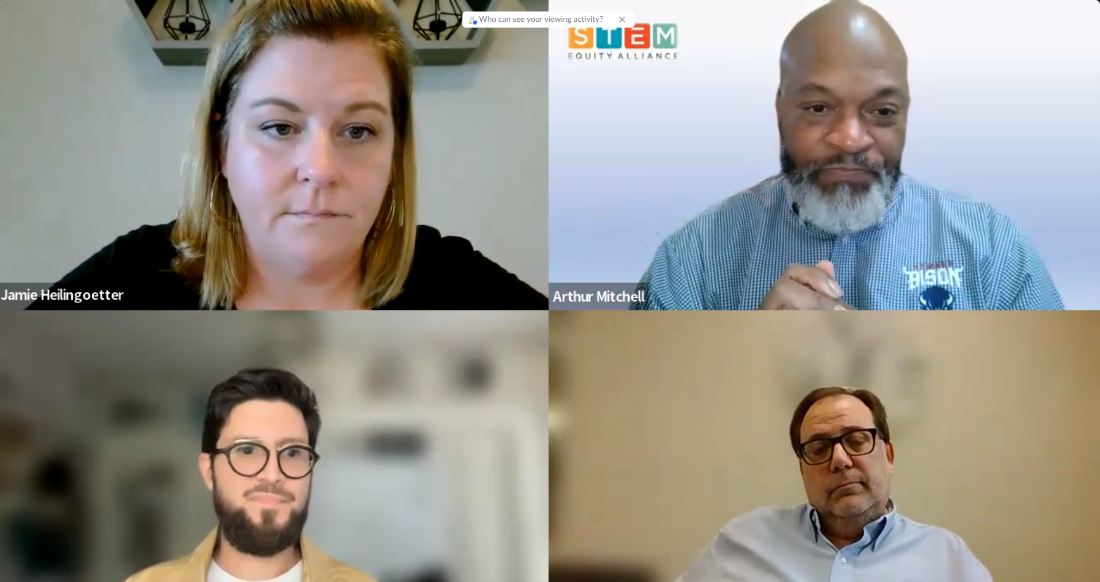
Session 5 of the STEM summit was titled “Building Sustainable Futures: STEM Innovations and Global Impact,” Dr. Flowers, PhD, Chief Education Officer at Sustainable Forestry Initiative, was the keynote speaker. She discussed the importance of STEM innovations and their global impact on building a sustainable future. She emphasized the critical role of education and collaboration in addressing environmental and sustainability challenges.
Dr. Flowers began by highlighting the significance of the topic and the need for collaborative efforts. She mentioned her involvement with the Sustainable Forestry Initiative (SFI) and its role in advancing sustainability through forest-focused collaborations.
The speaker emphasized the importance of environmental literacy and sustainability in education, particularly in helping educators instill these values in students. She presented a comic illustrating the “tragedy of the commons,” demonstrating how overexploiting shared resources can lead to environmental degradation and global challenges like climate change.
Dr. Flowers stressed the urgency of addressing climate-related issues such as rising greenhouse gas emissions, extreme heat conditions, and sea level rise. She underscored the need for collaboration, especially in the context of STEM education, to prepare the next generation for green jobs and environmental stewardship.
She discussed SFI’s efforts to manage forests sustainably and the role of forests in carbon capture and storage. Dr. Flowers compared the carbon stored in forests to the emissions from cars, highlighting the importance of responsible forest management in mitigating climate change.
Dr. Flowers addressed the critical role of education in creating innovative solutions for sustainability, emphasizing that everything starts with education. She mentioned the need to expose students, especially those from underrepresented backgrounds, to STEM opportunities and career pathways related to sustainability.
She concluded by advocating for local action with global impact, encouraging individuals to make environmentally conscious choices in their daily lives, such as reducing waste and carbon emissions. She emphasized that small changes can collectively contribute to a more sustainable future.
WATCH THE RECORDING
Thanks to our Presenting Sponsor, Shell, as well as Boardwalk Pipelines, Corebridge Financial. Thank you to our partners for their collaboration: Early Learning Alliance, Molina Health Care, United Way Tarrant County, Children’s Defense Fund Texas, Alchemy Studios and Labs, Fab Lab El Paso, Society of Hispanic Professional Engineers (SHPE), Texas A&M Commerce-Physics and Astronomy Department. To learn more about the Texas Family Leadership Council and our collaborative working groups, visit childrenatrisk.org/txflc/
Have questions about joining us as a sponsor or partner on an upcoming Learning Event? Reach out to learning@childrenatrisk.org
MORE LIKE THIS
Recap | 2024 Texas Equity Tour
Written by Ashley Watts, Texas Racial Equity Collaborative (TREC) Doctoral Fellow and Briauna Derry, Associate Director of Media Activism. In 2021, the Texas Racial Equity Collaborative (TREC) first gathered, united in their belief that working together could bring...
2024 C@R Special Events
Special Eventsconvening for change Every dollar donated helps us improve the lives of Texas children. CHILDREN AT RISK is a 501(c)(3) non-profit organization (EIN: 76-0360533). Contributions are tax-deductible to the fullest extent allowed by law. It is with immense...
2023 Annual Report
It is with immense pride and joy that we announce the start of a significant milestone: the 35th Anniversary of CHILDREN AT RISK. For over three decades, our organization has been at the forefront of advocating for the well-being and rights of vulnerable children,...
2024 Equity Tour
The Texas Equity Tour, slated for March and April 2024, is a pivotal event organized by CHILDREN AT RISK (C@R) to address systemic racism and its impact on Texas children and families. Rooted in the principles of racial equity, the tour serves as a platform to present...
2024 C@R Learning Events
Learning Eventsconvening for change CHILDREN AT RISK is committed to hosting free events that engage the public and help them drive change for children. We aim to share research, unpack pressing policy issues, and highlight diverse community perspectives from across...
